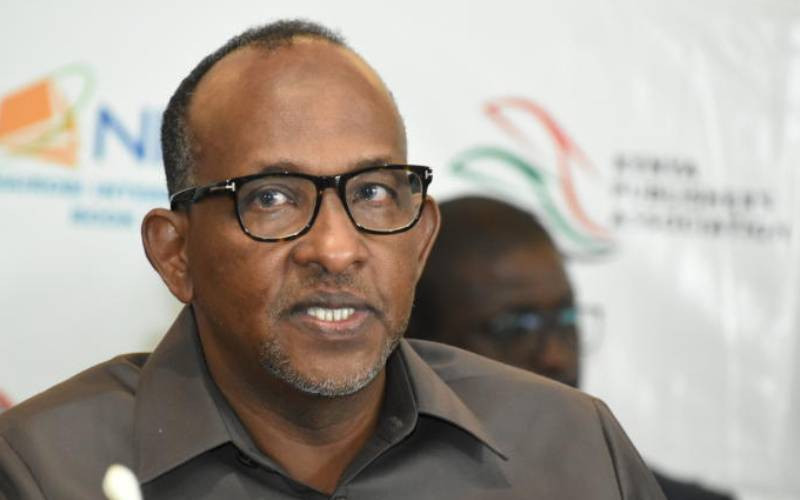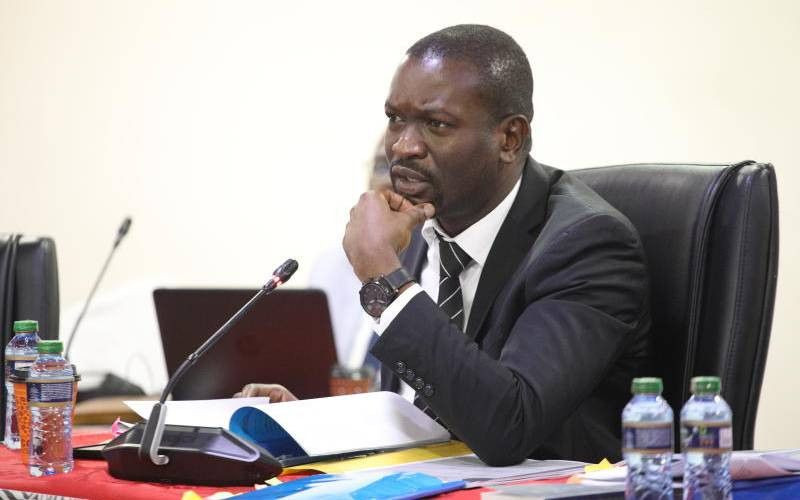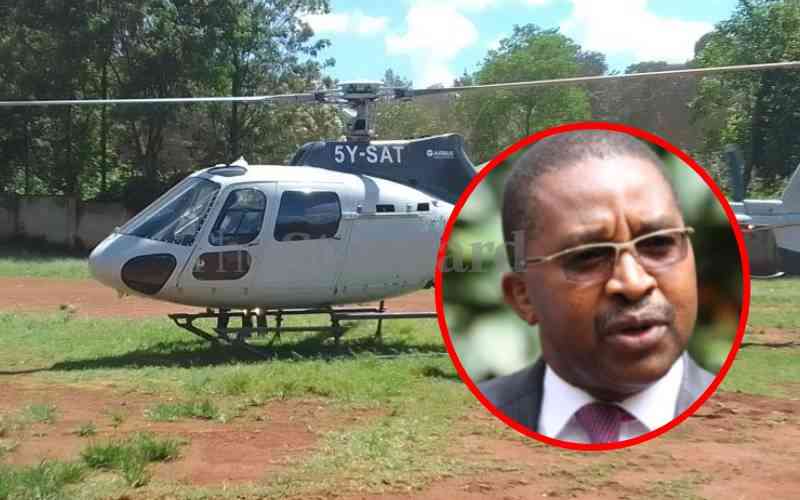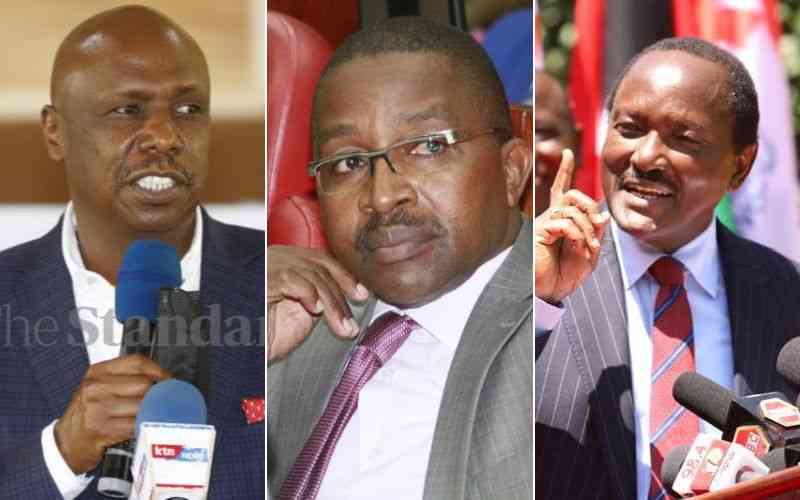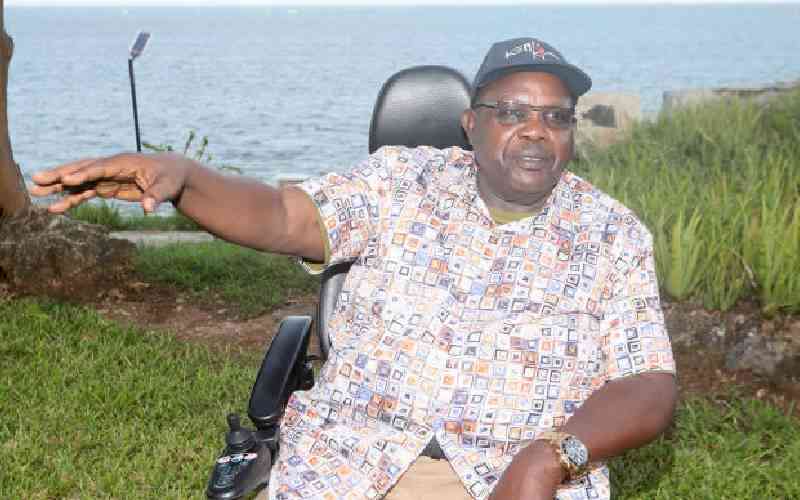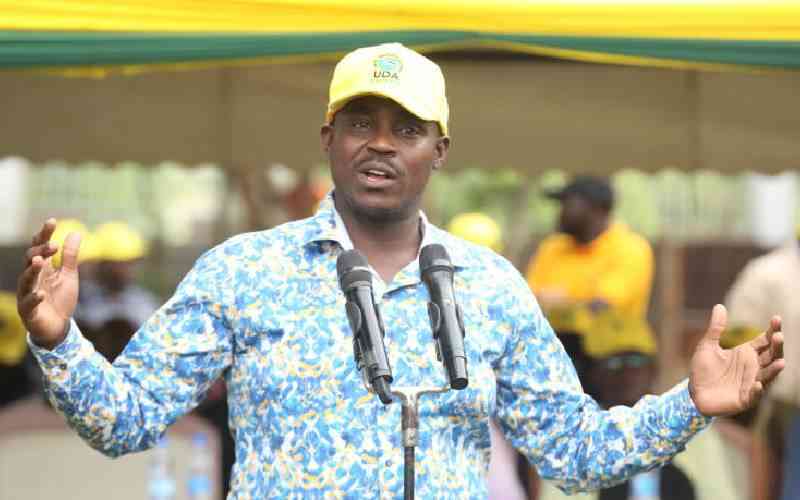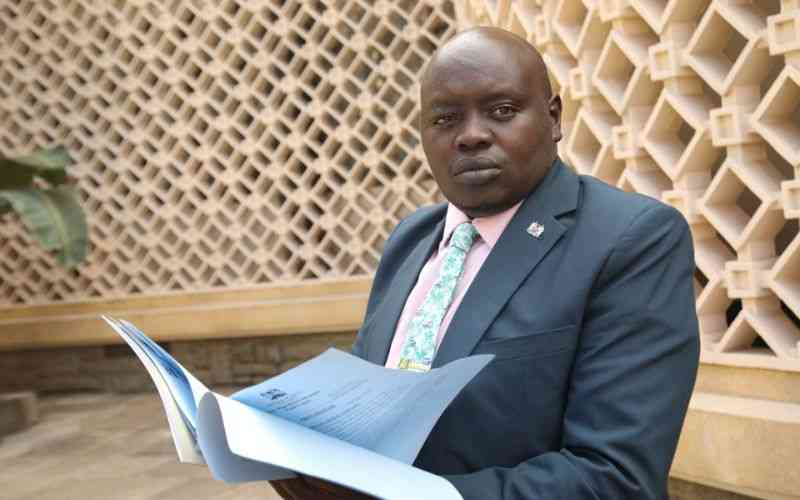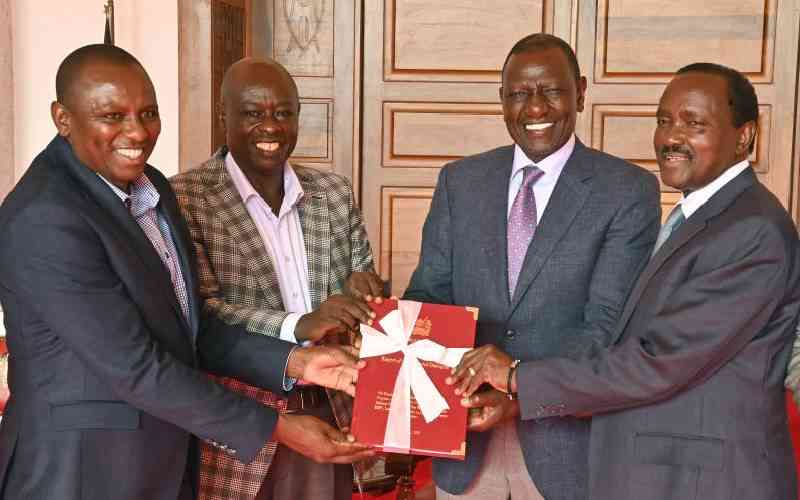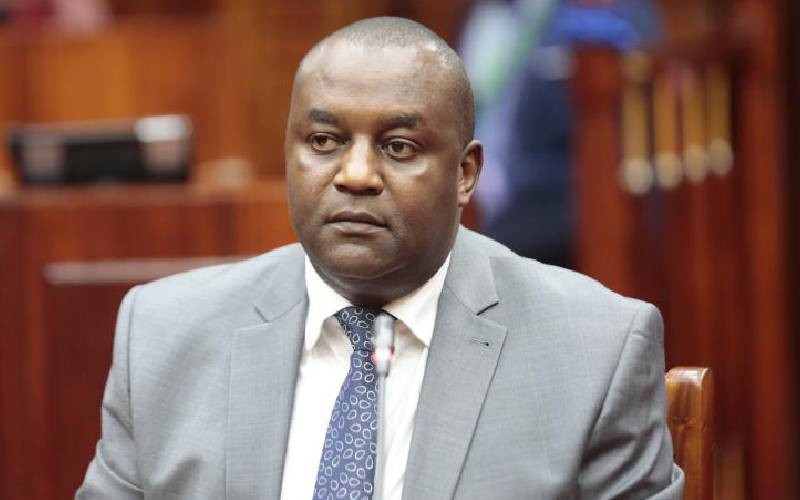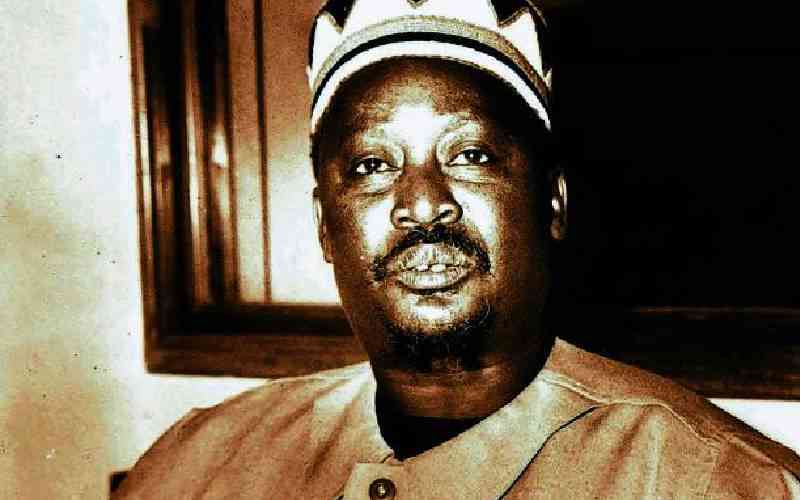
It was unusually dark.
I had just left a club and entered an alley that provided a shorter route to my house in Kisumu's Migosi estate.
The sound of music from the club was gradually dying as I walked further away. For a few hours, I enjoyed my favourite meal of fish and ugali and drowned it with a bottle of beer. I listened to some rumba then left for the night.
The darkness in the passageway thickened and the silence intensified. I suddenly sensed some company. Armed men emerged with torches blazing. "Wewe simama hapo", the tallest of them shouted. I stood still. I was surrounded. I was cornered. I didn't know how many they were.
I didn't know what weapons they carried. For a few seconds, I waited. If they were mere robbers in need of money then I would gladly surrender my wallet and walk home. But if they were sent to do me harm, then I would have to fall with many of them.
The tall one looked at me keenly. He didn't say a word but carefully studied me. His smelly mouth came so close to mine I almost threw up. Then something strange happened. He suddenly stopped. Shaking his head, he slowly retreated like one who had remembered something important. He raised his hand and ordered the group to leave.
"We cannot attack him. He is the newspaper man, the friend of Jaramogi and the Karate teacher"
The following day as I drove to Bondo, the event of the previous night kept replaying in my mind. God had spared me harm on the eve of my important lunch date with the doyen of Kenya's opposition politics, Jaramogi Oginga Odinga. This was the second time my life was spared based on my closeness to Odinga.
Odinga and I had established an emotional connection. He would frequently invite me to his home for lunch. I ensured I always arrived an hour earlier.
A friend to Jaramogi
On this Saturday afternoon, I found the old man taking a walk around his front yard.
After enjoying a sumptuous meal, we started talking about the 1992 presidential election. At one point, after analysing all possible scenarios, he paused and said, "In this election, I don't want to leave any business or matter incomplete.
I don't want a repeat of what happened to me when I served as vice president under Jomo Kenyatta."
"What happened, Sir?" I asked curiously.
"My letter of resignation never reached Jomo. Some two girls tore it into two and each chewed and swallowed a piece." When I asked him to give me details, he waved his hand and bid me farewell.
Working under Jomo Kenyatta
During my tour of duty as a journalist and editor, I have had the privilege of covering and engaging with all former vice/deputy presidents, save for the late Joseph Murumbi and the current Rigathi Gachagua.
In the old constitution, the vice presidents served at the will of the president. They could be hired and fired at will. They had to work with humility and stay obedient.
Jaramogi Oginga Odinga and Mzee Jomo Kenyatta had a business and political love that ran deep.
When the colonialists wanted to offer Kenyans early independence with Odinga taking charge, Jaramogi said there can be no Uhuru without Kenyatta.
The fire that burnt down their joint political tent was lit in Kisumu when Kenyatta went to officially open the New Nyanza General Hospital which had been built with the aid of the Government of Russia using Jaramogi's connections.
The Luo community had just buried one of their younger sons, Thomas Joseph Mboya who had been assassinated on the streets of Nairobi. Jomo's government was blamed for the murder.
Jomo defied advice from his security advisors to skip the Kisumu function. He asked his head of civil service, Geoffrey Kareithi, "Is Kisumu not part of Kenya?" Violence broke out on the hospital grounds as Jomo was delivering his speech. Stones started flying towards the presidential dais.
Fuming, Jomo engaged Odinga in a vicious verbal combat. Odinga dared him to: "Detain me in Manyani".
Eventually, Jomo's security personnel managed to pull him away from the dais and threw him into his vehicle.
Kareithi recalls in his yet-to-be-published memoir that crowds of angry people surged forward to stop the presidential convoy. Rocks, stones, bricks and branches were smashing every car in the convoy. The security detail covered Jomo in the back seat of his vehicle.
"Several 504 station wagons had been fitted with automatic weapons and were manned by commandos on each side of the convoy.
"On order, they opened the car doors and boots and opened fire directly into the crowd clearing a path out of Kisumu by sheer weight of gunfire," says Kareithi in his memoir Cool Under Fire.
Kareithi says intelligence reports indicated that the crowd was to pull the president out of his car and kill him. Despite Kenyatta's screams from under his body guard to stop the mayhem; his security detail delivered him safely to State House, Nakuru.
Kareithi remembers Odinga as a; charismatic, charming and honest man. His only weakness, says Kareithi, is that he would at times allow himself to be overwhelmed by raw emotion.
"Soon after Odinga resigned. I had accompanied Bruce McKenzie to discuss some ministerial matters with the president in Gatundu when the then US Ambassador to Kenya, William Atwood, dropped in. Atwood brought up the issue of Odinga, and asked Kenyatta what he thought of his decision to quit," says Kareithi
Kenyatta said: "I am not bitter about him. I like Odinga. But he was very foolish."
After some reflection, the president added: "when I first met him (Odinga), he was a successful businessman. Then I persuaded him to come into politics. That was a mistake. He does not understand politics. Now I think he should go back and be a businessman again. That would be good for him and good for Kenya."
In the 1970s Odinga applied for a licence to establish the only gas cylinder manufacturing firm in East Africa, through government funding under the Kenya Industrial Estates. Kenyatta ordered that Odinga be given a go-ahead and be facilitated in his business venture.
"I also knew there was a determined effort that Kenyatta meets his old friend, Odinga, in the last years before Kenyatta's death, but it was always blocked by gatekeepers at State House," recalls Kareithi.
The Resignation
Many years passed before I met one of the girls who tore and ate Odinga's resignation letter.
Former Karuochonyo MP and women leader Phoebe Asiyo commissioned me to write her memoir close to 10 years ago. I plunged into the assignment with passion and enthusiasm. Mama Asiyo has a rich and riveting story.
"Jael Mbogo and I found Mzee Jaramogi Oginga Odinga in his office. He looked tense and restless. After greetings as we sat down, he told us that he had just signed his resignation letter.
"I picked up the letter, tore it into half and gave Jael one half. We folded the pieces and threw them into our mouths. We then urged him to stick in Kanu.
"However, since he had already told Jomo he had resigned, Jomo accepted his resignation and Jaramogi moved on. The resignation letter never reached Kenyatta. It ended up in our stomachs."
I never completed the book assignment despite gathering tonnes of notes.
Moi's tenure
Jomo Kenyatta appointed Daniel arap Moi the third vice president after Jaramogi and Murumbi's tenure wasn't as dramatic as was Moi's.
Daniel Moi had; the wisdom of a serpent, the patience of an eagle and the cunning of a fox. He was the most emotionally abused vice president.
A group of leaders from Kiambu and Rift Valley who believed that the country's leadership and presidency belonged to the Kikuyu community, made every effort to frustrate Moi. I loved going to public rallies at Nakuru's Kamukunji grounds.
During one rally addressed by Jomo Kenyatta I witnessed Kihika Kimani, then a powerful and feared Nakuru politician, roughing up Moi. He even asked the crowd in Kikuyu; "What kind of vice president is this one?" Both Moi and Jomo sat quietly.
Dr. Njoroge Mungai was to tell me later; "After what we did to Moi during the era of Jomo Kenyatta, I have come to fear and respect him. He's a unique man with extraordinary patience, tolerance and calmness. There were some senior cabinet meetings we would hold in Kenyatta's Gatundu home. Kikuyu would be the language of communication.
Moi would wait outside to be briefed later. He never complained.
Kibaki's turn
When Moi became president following the demise of Jomo Kenyatta in 1978, he appointed Mwai Kibaki his vice president. Kibaki served under very difficult conditions especially after the 1982 coup attempt when Moi became restless and suspicious of almost everyone.
Former Central Provincial Commissioner, later Kitui Senator David Musila captures one frustrating moment in his memoir; Seasons of Hope. When the coup broke out, Musila sent security personnel to pick up Kibaki from his Othaya home. The only place Musila and team could think of hiding the VP was a dusty storeroom inside the Nyeri Country Club.
Later in the evening after the coup had been contained, Kibaki was taken to the PC's residence. Moi called to receive security briefs from the PC. After the briefing, Musila informed him that his deputy was there. Moi said he didn't want to talk to him.
Soon Kibaki was branded anti-Moi. He was demonised in public meetings and his friends harassed. When Kibaki's father was murdered by his farm worker, Moi failed to attend his burial and dispatched a representative. After six years under fire, Kibaki was dropped in 1988.
He was a victim of the infamous mlolongo Kanu elections. University don, Dr Josephat Karanja was appointed VP on March 24, 1988.
Kneel before me
Karanja was a quiet man who was completely removed from reality. Many say he became arrogant, drunk with power. During the single party days, a simple narrative could end one's career. When Moi insiders got tired of Karanja, they set two men upon him; Embakasi MP David Mwenje and director of motor vehicle inspection Kuria Kanyingi.
The two claimed that he wanted other leaders to kneel before him and worship him. On May 1, 1989, Karanja was dropped.
Ajuata, the ungrateful beggar
While looking at the character of all the Vice and Deputy Presidents, I remembered a sermon. At a local market in Luo Nyanza, there lived a blind beggar called Ajuata. On many occasions generous people would walk with him to a local restaurant and order a meal for him. There were occasions when he would be served ugali with meat in a bowl of soup. Before eating, Ajuata would gently dip his long fingers inside the bowl and slowly navigate every corner counting the pieces of meat.
He would then say, "If I Ajuata can be given this amount of meat. I can't imagine how much more is given to those with eyes."
"Ajuata," says the Deacon, "is a man who is blind twice, both physically and spiritually. He is ungrateful to his benefactors."
Some political analysts are whispering that if DP Rigathi Gachagua doesn't watch his tongue, he will enter straight into the akala shoes of Ajuata.
They say when he openly proclaimed that he had rallied his Mt Kenya regional support base in Parliament behind the successful EALA bid of former Kieni MP Kanini Kega, he was, like Ajuata, tasting the soup and bowl with his fingers. Some supporters say President William Ruto himself didn't even wait for soup to be served when he was deputy to Uhuru Kenyatta. They say he followed the meal from the kitchen and ungratefully stirred it while throwing obscenities at his boss. Whether or not Gachagua will follow that script, only time will tell.
 The Standard Group Plc is a multi-media organization with investments in media platforms spanning newspaper print
operations, television, radio broadcasting, digital and online services. The Standard Group is recognized as a
leading multi-media house in Kenya with a key influence in matters of national and international interest.
The Standard Group Plc is a multi-media organization with investments in media platforms spanning newspaper print
operations, television, radio broadcasting, digital and online services. The Standard Group is recognized as a
leading multi-media house in Kenya with a key influence in matters of national and international interest.

